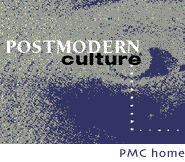
Abstracts
Volume 17, Number 3May, 2007
- Abstract: The essay investigates the representational constraints and presuppositions that generate images of war and influence their reception, or lack of reception, by the U.S. public. Such journalism still largely follows representational practices put into place during the eighteenth century, a structure of representation that has outlived its usefulness. Following Bruno Latour's observation that, for critique, the "question was never to get away from facts but closer to them, not fighting empiricism but, on the contrary, renewing empiricism," it is suggested that recent controversies over war photos, and over those of Abu Ghraib in particular, often substitute an argument about images for one that confronts the acts they depict. The "prisoner abuse" story is of course far from settled; in fact it's hardly been opened. And yet, as Ernesto Sábato's preface to Nunca Más (the work published by the Argentine National Commission on the Disappeared) demonstrated long ago, properly applied, even narratology can have policy implications. --jh
- Abstract: The essay opens with a general consideration of art and ethics in Badiou's philosophy in order to describe his subject as faithful to an event that pierces a given situation with its hitherto indiscernible truth. The essay then establishes connections between Badiou's work on the void of the situation, the hole of truth, and the rivenness of the subject, and Lacan's work on trauma and the real. This connection is seen in Badiou's description of truth as a radical alterity befalling the subject and constituting a hole in the existing order of language. The subject remains ethically faithful to a truth by introducing it into the language of the situation in which that truth appears. Because the existing situation cannot articulate a truth radically novel and alterior to itself, the subject must "poeticize" in order to name any truth, as this essay shows, whether artistic, amorous, political, or scientific. By describing Badiou's subject of art in terms of trauma, Badiou's theory of art is placed in relation with that of the Romantics. By describing Badiou's ethical subject in terms of trauma, the essay places Badiou's ethics in relation to Levinas's. The extent and limits of this comparison clarify Badiou's critique of Levinas, which is less general than commonly supposed, and help to intervene in potential misreadings of Badiou's work, which resists the pathos and horror typically attached to ethical considerations of trauma and the real. --rh
- Abstract: This essay examines the idea of the verbal photograph, particularly those in Anne Carson's novel Autobiography of Red and Barthes's winter garden photograph in Camera Lucida. The essay argues for a reconsideration of classic photography theory in light of the tensions around these seemingly absent photographs, suggesting that a counterpoint to the dominant equation of photography and death in photography theory is the alliance, abetted through narrative, of photography and love. --em
- Abstract: The "P" in "The Swerve around 'P'" refers to the Library of Congress designation for language, literature, and literary criticism/theory; the essay reflects on the fact that a lot of the work that's produced in literature departments these days doesn't end up in that section of the library (or, conversely, much of the research on the "P" shelves finds its primary engagements elsewhere: in history, sociology, science and technology, philosophy, social science, and so on). Literary scholarship isn't "literary" in quite the same way it was even a decade ago, in the sense that it's no longer primarily concerned with producing rival interpretations of existing or emerging literary artifacts. The reason there's no hot new interpretive paradigm on the horizon is not so much because of the exhaustion of theory itself, but because the work of interpretation is no longer the primary research work of literature departments. However, it is precisely in the name of re-imagining a research future for literary theory that I turn to Alain Badiou's account of the literary's demise in recent philosophy. My provocation here, if I have one at all, is to ask theoreticians to rethink possible relations among literature and philosophy, other than in the key of interpretation--which (despite ubiquitous claims to the contrary) has been the dominant research practice of the "big theory" era in North America.--jtn
- Abstract: The rise of new media studies has brought attention to artists such as Bill Viola while renewing scholarly interest in the works of Maurice Merleau-Ponty. This essay provides analyses of Merleau-Ponty and Viola that go against the grain of current scholarship on them both. By privileging the category of the gestural--central in Merleau-Ponty's meditations but often eclipsed in recent criticism--the essay contradicts a trend in new media theory that associates embodiment not with motor intentionality but instead with a far more mysterious entity called "affect." Reading Viola's The Passions through Merleau-Ponty's Phenomenology of Perception, the essay brings to bear the author's experience as a movement practitioner to restore the register of gestural performance to Viola's visual images. --cn
Jim Hicks, Narrowing the Range of Permissible Lies: Recent Battles in the International Image Tribunal
Robert Hughes, Riven: Badiou's Ethical Subject and the Event of Art as Trauma
E.L. McCallum, Toward a Photography of Love: The Tain of the Photograph in Anne Carson's Autobiography of Red
Jeffrey T. Nealon, The Swerve Around P: Literary Theory after Interpretation
Carrie Noland, Motor Intentionality: Gestural Meaning in Bill Viola and Merleau-Ponty
Copyright © 2007-1990 Postmodern Culture & the Johns Hopkins University Press. CONTENTS OF THIS ISSUE ARE AVAILABLE FREE OF CHARGE UNTIL RELEASE OF THE NEXT ISSUE. A TEXT-ONLY ARCHIVE OF THE JOURNAL IS ALSO AVAILABLE FREE OF CHARGE. FOR FULL HYPERTEXT ACCESS TO BACK ISSUES, SEARCH UTILITIES, AND OTHER VALUABLE FEATURES, YOU OR YOUR INSTITUTION MAY SUBSCRIBE TO PROJECT MUSE, THE ON-LINE JOURNALS PROJECT OF THE JOHNS HOPKINS UNIVERSITY PRESS.
